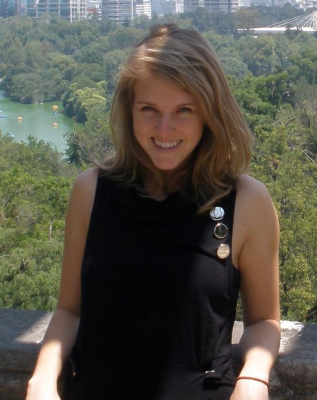Student Spotlight: Ann Bybee-Finley

What is your area of research?
I study agroecology in the field of soil and crop sciences in the School of Integrative Plant Sciences. Agroecology is the study of agriculture as an ecosystem and draws a lot of from ecology.
What inspired you to choose this field of study?
Many small life events. I have always been driven by the desire to serve my community. Plants make happy, the way they interact with each other and other organisms is wondrous. A long fascination with the notion that humans can better integrate themselves into natural ecosystems by reconfiguring our paradigms of how we produce food.
Why is this research important?
Looking at the landscape of U.S. agriculture we have less people in touch with the food system than ever before, we spend the lowest amount of our wage on food, about one in seven people in our population is food insecure (my whole home state WV is a food desert), we have a declining farm population (1.8%), we have an increasing farm size, the majority of agricultural subsidies go to the largest farms, we have decreasing or stagnant funding for extension and outreach, and the largest agrochemical companies are in the process of buying each other up, not to mention that agriculture is responsible for about 10% of greenhouse gas emissions and nutrient pollution is causing vast dead zones on our coasts. There are two ways to look at these problems, you can say this agricultural system is inefficient and let’s try to improve our practices. Or you can say this current agricultural system is problematic, why don’t we spend time on examining alternative systems. Eventually the solution will be somewhere in the middle, but I think you will get better progress by using both approaches. I think a lot of agroecological ideas are coming from that alternative system perspective.
Personally, I am examining different practices, like intercropping and double-cropping, Northeastern dairy farmers could do to maintain farm productivity and improve soil health, which reduces their risk of being affected by droughts or floods.
How has your background influenced your scholarship?
I have always liked the idea of dynamic equilibrium, a stable system but in a state of flux. I like this idea at a small-scale and so I studied biochemistry and I like this at a large geopolitical scale, which is why I studied international development. I have had the privilege to travel to about 40 counties, and I have seen their agriculture and experienced their food culture; that has given me a lot of perspective.
What else has influenced your thinking as a researcher or scholar?
Remembering that everyone makes mistakes and that failures are a part of being human. Other influencers are my family, my friends, reading a lot—news, fiction, nonfiction, agriculture policy, and speaking with people outside of my discipline. Certainly my advisor Matthew Ryan and my labmates in the Sustainable Cropping Systems Lab. My identities as a woman, as an Appalachian, as a person who has seen death up close.
I understand that you’ve been named a 2017 Future Leader in Science by the American Society of Agronomy (ASA), Crop Science Society of America (CSSA) and Soil Science Society of America (SSSA). Congratulations! What does this award mean to you?
Thank you. I think as a young scientist you have new ideas and it feels great when your work is recognized or validated. I hope it means other things will be more likely to happen—I’d like for everyone to be aware of the field of agroecology. But it certainly begs the question, at what point does a “future leader” become a “leader”?
As part of this award, you traveled to Washington, D.C. to attend the annual ASA, CSSA and SSSA Congressional Visits Day. What was that experience like?
We were there advocating for AFRI (Agriculture and Food Research Initiative) funding, which is the largest competitive grants program for agriculture research. It is currently funded at about half the amount that has been allotted, which means a lot of research ideas that should be funded, aren’t. How would our agrofood system look different if they were? It was eye-opening to hear what questions congressional staffers asked, a lot of their questions were focused on economics, which was not surprising but a little sad because economics is just one perspective, but one that is currently overrepresented in policy-making.
Why did you choose Cornell to pursue your degree?
Cornell had the world’s best Agronomy Department and Matthew Ryan is the most amazing advisor anyone could ask for.
What’s next for you?
Next month I’m headed to California because my team (4 Johnson MBA students and 1 MS student in behavioral economics) made it to the final rounds of a case competition for Patagonia about how to source regenerative organic agriculture products. The usual grind of working to publish research. More advocacy for agroecology and extension.
Any advice for incoming graduate students?
Take the time to figure out what research questions make you happy because you are going to spend a lot of hours with them. And again, remembering that everyone makes mistakes and that failures are a part of being human.
Interview by Sally Kral, communications and outreach assistant in the Graduate School
